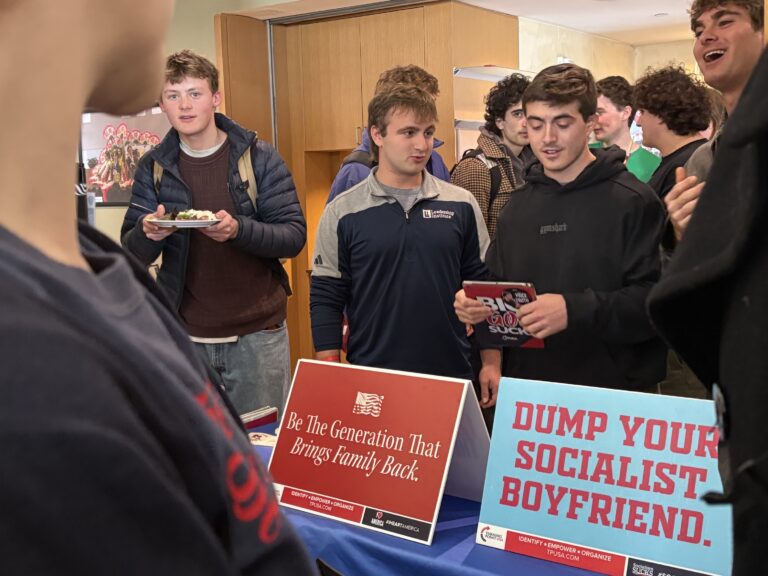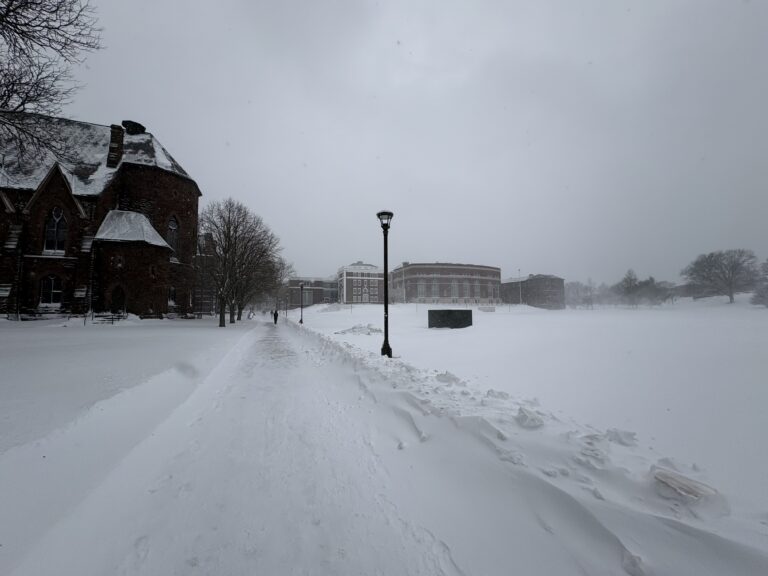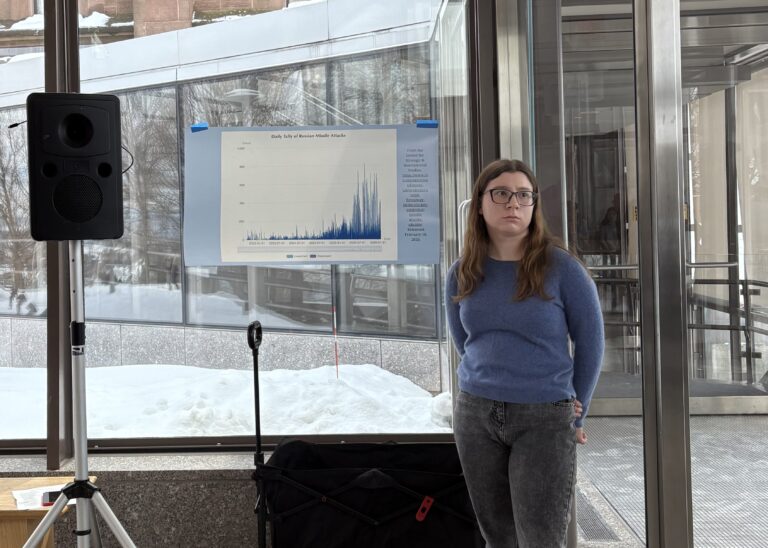NYC protest undeterred by rain
Amid a sea of jostling umbrellas, 36 Wesleyan students marched through pouring rain in New York last Saturday as part of an anti-war protest sponsored by the national coalition United For Peace and Justice (UFPJ).
The protest was part of a national day of action, which included 11 other anti-war protests in 11 cities across the country, including Boston, New Orleans, and San Francisco. The event’s website, www.oct27.org, estimated the total national turnout to be at least 100,000.
New York’s three-mile march from Union to Foley Square saw a turnout of approximately 45,000, according to the website. This was in spite of weather that created roaring streams of water through the gutters of SoHo and left marchers shivering and drenched. Even the paint on the “Wesleyan Students Against the War” banner began to run, leaving students who carried it with red and black stains smeared across their palms.
“I loved that it was in the rain,” said Students for Ending the War in Iraq (SEWI) member Lucas Guilkey ’10. “It makes you have that much more energy. It was very refreshing, and epic.”
SEWI is officially affiliated with UFPJ, a national coalition that encompasses approximately 1,400 research and advocacy organizations. About 12 of these, including Code Pink, an anti-war women’s group, the Progressive Democrats of America, and the New York Chapter of Veterans for Peace had set up informational tables at a peace rally awaiting protestors at the end of the march, in Foley Square.
“It was wet, but festive, creative and life affirming,” said Nancy Kricorian, the Code Pink Coordinator for New York City and also a member of the Code Pink National Staff.
Carrying signs inscribed with slogans such as “Money For Schools, Not For War” and “Is This Facism Yet?” crowds of people marched the 25 blocks down Broadway Street to the rally awaiting them.
“I was really impressed by the amount of people who showed up,”
said SEWI member Miranda Becker ’11. “There was a mile and half of people despite the rain. Four years ago something like rain would have kept me at home, but now this just goes to show that people are passionate enough not to let something trivial as the weather stop them.”
As marchers wandered through Foley Square signing petitions and talking politics with one another, the downpour showed no sign of dissipating. This did not deter marchers from setting up an impromptu band around an effigy of Hillary Clinton, banging on conga drums and white plastic buckets with sticks.
Huge puddles on the street also did not deter a local chapter of Students for a Democratic Society (SDS) from staging a die-in, in order to “show the world what it would look like if the U.S. went into Iran,” an SDS member told the crowd through a megaphone.
As much as the day’s speeches and chants focused on the current U.S. military presence in Iraq and Afghanistan, many groups emphasized concern over potential intervention in Iran.
“As bad as [the Iraq] situation is, it’s also urgent to try and prevent another military attack on Iran,” said John Burroughs, executive director of the Lawyers’ Committee of Nuclear Policy, one of the many organizations that participated in the Foley Square peace fair.
Another central concern, as expressed in the SDS rally and SEWI chants for “money for jobs and education, not for war and occupation,” was the financial cost of the war at the expense of national issues.
“How is it that they have three trillion dollars to piss away in Iraq and Afghanistan, and they can’t put any of that to fixing the public schools in this fucking city?” said Jesse Overall ’11 during the SDS rally, earning a big cheer from SDS members still in high school.
Other protestors, meanwhile, focused their energy on the presence of two police officers at the top of the Court of International Trade, observing Foley Square through binoculars.
“Satellite Nazis, fuck you!” shouted one man wearing a Ron Paul hat carrying a sign which read “Hillary ’08: War More Years,” waving his raised middle finger in the direction of the building. “You got nothing on J. Edgar Hoover!”
Wesleyan students also attended the UFPJ-backed Jan. 27 protest in Washington D.C., while twenty attended the May 2, 2006 rally in New York City. Saturday’s rally marked the five-year anniversary of the U.S. Senate vote endorsing military action against Iraq, which led several non-profits to reflect on the next step in the anti-war movement.
“It’s going to require a lot of perseverance and patience, and more people becoming public in their opposition,” said Jacqueline Cabasso, a member of the United for Peace and Justice Steering Committee. “The polls show that the majority of Americans are against the war, so if we had 70 percent of people in the streets… more people would have to take it personally.”
John Burroughs, there representing a nuclear disarmament organization, agreed.
“People are going to have to be prepared to be creative, disruptive and non-violent,” he said. “So far opposition has been expressed through voting, but that’s clearly not enough.”
“One new idea is trying to get people to withhold taxes,” said Kricorian, the Code Pink Coordinator for New York City. “If we can’t get Congress to listen, if we can’t get the President to listen, maybe it’s time for individual citizens to hearken back to the early days of the Republic. The Boston tea party was about withholding taxes.”
“That might just have to be the next step,” she added. “We’ve tried everything. We might have to come to that.”
For SEWI, the next step in the anti-war movement is continuing the campaign for University divestment from military contractors General Dynamics and Raytheon. Last semester, the campaign saw the Wesleyan Student Assembly (WSA) passing a pro-divestment resolution on April 28. During Saturday’s protest, SEWI members also met with student representatives from Columbia, Rutgers, Hunter College, Brooklyn College, NYU and Pace in order to discuss drafting a joint statement regarding university divestment from weapons contractors.
SEWI member Erik Rosenberg ’08 cited the divestment campaign run by the Columbia Coalition Against the War as an example of other student groups confronting campus complicity with the Iraq conflict.
According to an opinion piece published by the Columbia Coalition Against the War in the Columbia Spectator on Sept. 18, Columbia has over $4 million invested in General Dynamics, Raytheon and Lockheed Martin.
“It’s weird because Columbia publishes a report [detailing its investments],” Rosenberg said. “We went and talked to Tom Kannam [Vice President of the Investment Office] and asked to see the University’s investment policy and see how much money we actually have invested in General Dynamics and Raytheon, but it’s been one business week and they haven’t gotten back to us.”
SEWI will meet with President Michael Roth to discuss divestment on Nov. 9.







Leave a Reply